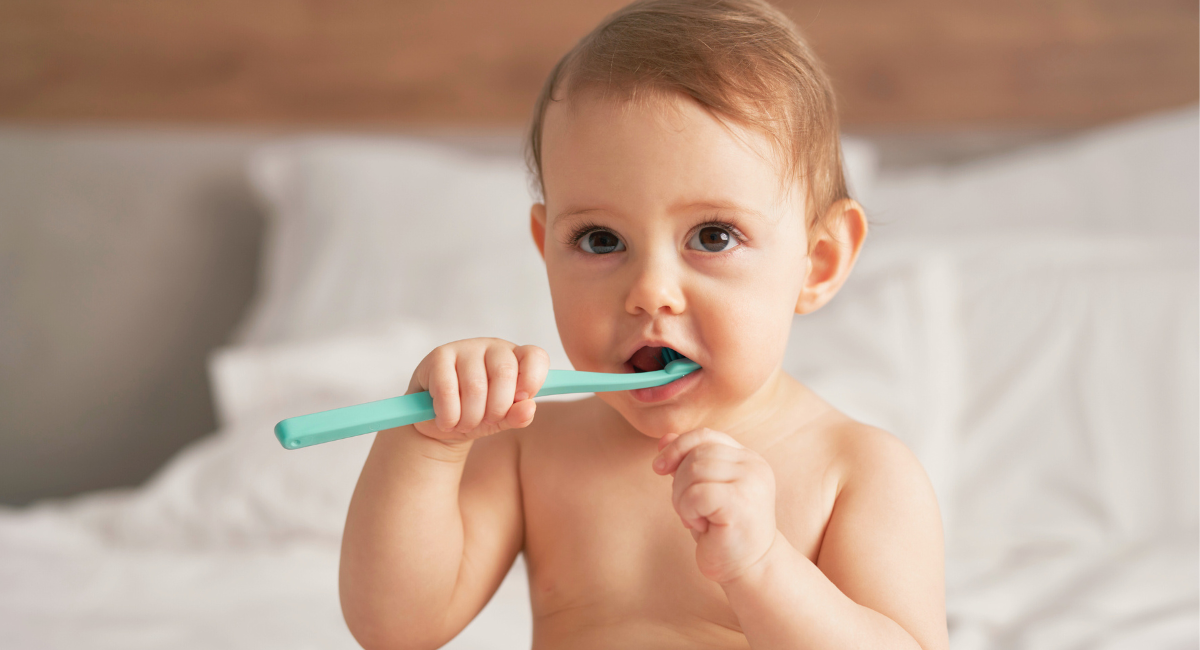
Did you know that germs that are passed from adults to children cause cavities? Babies are born without the bacteria that cause the disease that leads to cavities. They get it from saliva that is passed from their caregiver’s mouth to their own. This occurs by sharing utensils, testing food before giving it to babies, cleaning pacifiers with spit instead of water, and through other activities where saliva is shared. These germs start the process that causes cavities even before babies have teeth, so it is important to avoid sharing saliva with your baby right from birth. The following are some tips to help promote the health of your child’s teeth.
- Do not put anything in your baby’s mouth that has been in your mouth.
- Before your child has teeth, wipe his/her gums daily with a moist washcloth.
- Once teeth are visible, brush teeth with a soft bristle brush twice per day.
- Once your child has teeth, ask your pediatrician about using fluoride.
- The most important time to brush teeth is right before bedtime.
- Establish bedtime routines that do not involve bottles filled with milk or juice to soothe your infant to sleep. Sugars in these liquids will get changed to acid, which will rot and decay your child’s teeth.
- Avoid having your child drink milk or juice from a sippy cup between meals. Constant drinking of these liquids during the day keeps the teeth bathed in sugars that are harmful to your child’s teeth. Instead, encourage water.
- Limit juice to no more than 4-6 ounces per day.
- If you see spots developing on your child’s teeth, call your pediatrician.
Teeth are important – 10 simple tips for a healthy smile
- Lift the lip every month; look for early cavities – white chalky lines along the gum line.
- Clean child’s teeth and gums twice daily.
- No bottles or sippy cups in bed unless there is water in it.
- Once teeth have come in, don’t let your child fall asleep while nursing or bottle-feeding.
- Introduce a cup at 6 months. Wean from a bottle by age 1.
- Don’t share germs – Do not clean pacifier in your mouth. Do not eat food off the same spoon.
- Love your children by giving “teeth healthy” snacks – choose water, fruit, cheese, and milk.
- Team brush until age 8 – Help with brushing at least once a day using very little toothpaste. Motivate using music or stickers.
- Floss- if the teeth touch then you need to floss.
- Follow your doctor’s instructions for giving daily fluoride.
Sponsored by: State Oral Health Collaborative Systems Grants.
Discover More Must-Read Pediatric Tips and Advice
At Monadnock Community Hospital, we are committed to supporting you and your family with reliable information and expert advice. Be sure to check out our other pediatric blog posts for more tips on keeping your child healthy and happy. From newborn care to managing common childhood illnesses, our blog offers a wealth of knowledge to help you navigate the joys and challenges of parenthood.
Why Choose Monadnock Community Hospital’s Pediatrics Department?
Your child’s health is our top priority at Monadnock Regional Pediatrics. From birth through adolescence, our expert team of board-certified pediatricians and nurses provides compassionate, personalized care. We partner with families to create tailored health plans that foster a healthy, happy future. Serving the community since 1923, we’re committed to delivering high-quality, accessible care in a warm and nurturing environment. Trust us to support your child’s well-being every step of the way.

 )
[_extra_sidebar_content_0_content] => Array
(
[0] => field_5b1ac5808389e
)
[_yoast_indexnow_last_ping] => Array
(
[0] => 1755707665
)
[page_sections_0_hero_slider] => Array
(
[0] => 0
)
[_page_sections_0_hero_slider] => Array
(
[0] => field_5af4ae4adb200
)
[page_sections_0_image] => Array
(
[0] => 38260
)
[_page_sections_0_image] => Array
(
[0] => field_5af4b0553202b
)
[page_sections_0_title] => Array
(
[0] =>
)
[_page_sections_0_title] => Array
(
[0] => field_5af99e4fd1223
)
[page_sections_0_text] => Array
(
[0] =>
)
[_page_sections_0_text] => Array
(
[0] => field_5bfc041f4dfcd
)
[page_sections_0_actions] => Array
(
[0] =>
)
[_page_sections_0_actions] => Array
(
[0] => field_5af4b0783202c
)
[page_sections_1_section_title] => Array
(
[0] =>
)
[_page_sections_1_section_title] => Array
(
[0] => field_5ada5134d3021
)
[page_sections_1_wysiwyg] => Array
(
[0] => Did you know that germs that are passed from adults to children cause cavities? Babies are born without the bacteria that cause the disease that leads to cavities. They get it from saliva that is passed from their caregiver’s mouth to their own. This occurs by sharing utensils, testing food before giving it to babies, cleaning pacifiers with spit instead of water, and through other activities where saliva is shared. These germs start the process that causes cavities even before babies have teeth, so it is important to avoid sharing saliva with your baby right from birth. The following are some tips to help promote the health of your child’s teeth.
)
[_extra_sidebar_content_0_content] => Array
(
[0] => field_5b1ac5808389e
)
[_yoast_indexnow_last_ping] => Array
(
[0] => 1755707665
)
[page_sections_0_hero_slider] => Array
(
[0] => 0
)
[_page_sections_0_hero_slider] => Array
(
[0] => field_5af4ae4adb200
)
[page_sections_0_image] => Array
(
[0] => 38260
)
[_page_sections_0_image] => Array
(
[0] => field_5af4b0553202b
)
[page_sections_0_title] => Array
(
[0] =>
)
[_page_sections_0_title] => Array
(
[0] => field_5af99e4fd1223
)
[page_sections_0_text] => Array
(
[0] =>
)
[_page_sections_0_text] => Array
(
[0] => field_5bfc041f4dfcd
)
[page_sections_0_actions] => Array
(
[0] =>
)
[_page_sections_0_actions] => Array
(
[0] => field_5af4b0783202c
)
[page_sections_1_section_title] => Array
(
[0] =>
)
[_page_sections_1_section_title] => Array
(
[0] => field_5ada5134d3021
)
[page_sections_1_wysiwyg] => Array
(
[0] => Did you know that germs that are passed from adults to children cause cavities? Babies are born without the bacteria that cause the disease that leads to cavities. They get it from saliva that is passed from their caregiver’s mouth to their own. This occurs by sharing utensils, testing food before giving it to babies, cleaning pacifiers with spit instead of water, and through other activities where saliva is shared. These germs start the process that causes cavities even before babies have teeth, so it is important to avoid sharing saliva with your baby right from birth. The following are some tips to help promote the health of your child’s teeth.